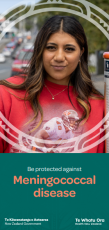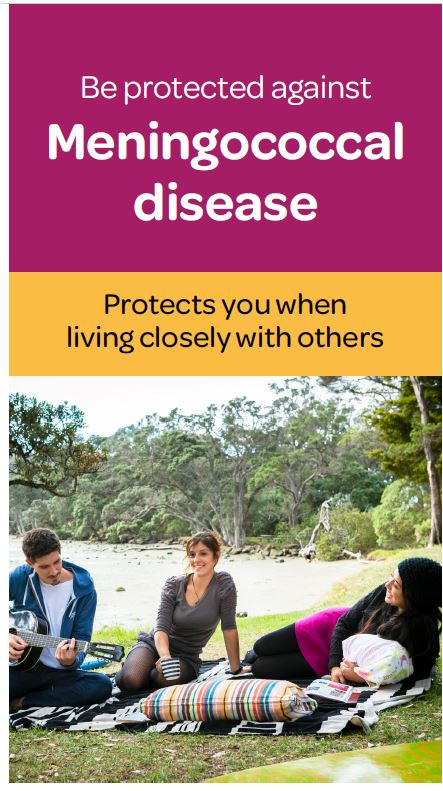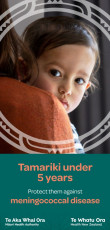Are you an NZ-based healthcare provider? Did you know we have a whole section on Healthify just for you, to assist in improving healthcare planning, delivery and outcomes?
Meningococcal vaccine
Be protected against meningococcal disease
Key points about the meningococcal vaccine
- Meningococcal vaccines protect against meningococcal disease.
- Meningococcal vaccines are also called MenQuadfi®, Bexsero® and Nimenrix®.
- Find out more about meningococcal vaccines.

Meningococcal vaccines are used to protect against meningococcal disease.
- Meningococcal disease can be life-threatening. It can develop and become deadly in just a few hours.
- People who survive meningococcal disease often have serious long-term effects. These can include amputation of limbs, hearing loss, seizures, brain injury and permanent skin scarring. Read more about meningococcal disease.
Meningococcal disease is caused by a bacteria called Neisseria meningitidis.
- At least 12 groups of N. meningitidis have been identified. These groups are named by letters. The most common groups in Aotearoa New Zealand are A, B, C, Y and W.
- There is no single vaccine that offers protection against all groups.
- There are different meningococcal vaccines registered in Aotearoa New Zealand to cover the different meningococcal groups:
- MenQuadfi® or Nimenrix® covers groups A, C, W, Y
- Bexsero® covers group B.
Meningococcal vaccines protect you against meningococcal disease and help stop it spreading to others.
MenQuadfi® and Bexsero® vaccines are free for people 13 to 25 years of age during their first year of living in a boarding school hostel, university hall of residence, military barracks or prison, or 3 months before they move in.
Note: Close living situations do not include flatting or other group living situations.
Bexsero is available on the childhood National Immunisation Programme
Bexsero is available for babies at 3 months, 5 months, and 12 months of age. It will protect your pēpi (baby) against meningococcal B.
- You can have your pēpi immunised earlier – at 2 months, 4 months, and 12 months old. This will mean extra appointments. Discuss this with your healthcare provider during your baby’s 6-week immunisations if you want to have them earlier.
- If your tamariki received their 3 month, 5 month, or 12 month immunisations before 1 March 2023, they wouldn't have received the Bexsero vaccine. But they can catch up.
- From 1 July 2024, Nimenrix® is free for high risk tamariki under 12 months of age. Read more about the eligibility criteria(external link).
- All tamariki under 5 years old, who haven't had 3 doses, can catch up for free. Read more about Bexsero.
Video: Immunise your child and protect them from meningococcal disease
(KidsHealth, NZ, 2023)
Meningococcal vaccines may also be available free for children and adults at high risk of disease due to medical conditions, or people who’ve been in close contact with someone with meningococcal disease. This includes Bexsero and MenQuadfi®.
Talk to your doctor, nurse, or other healthcare provider to see if this is recommended for you or your tamariki.
If you, or your tamariki, are not eligible for free immunisations, and you'd like to be protected, talk to your healthcare provider about whether extra protection is a good idea and what it might cost.
Having the meningococcal vaccine doesn't give you lifelong protection. When you get the vaccine, it causes your body to produce antibodies to fight against the infection if you come into contact with the illness. But over time the antibody levels decrease. In older children, adolescents and adults, protection is expected to last for up to 5 years after vaccination.
Meningococcal vaccines are given by injection into a muscle, usually your mid-thigh or upper arm. The number of doses needed depends on the brand used and the age of the person. You can receive more than 1 meningococcal vaccine at a time if more than 1 type is needed.
Like all medicines, meningococcal vaccines can cause side effects, although not everyone gets them. The chance of a severe reaction from a meningococcal vaccine is very small, but the risks from not being vaccinated against meningococcal disease may be very serious.
If you're concerned about any symptoms you think might be related to your vaccine, talk to your healthcare provider. The following information offers some guidance but doesn't include all possible side effects.
Read more about after your child is immunised(external link) and what to expect after your immunisation(external link).
Common side effects
Tell your healthcare provider if these side effects bother you:
- Pain, swelling or redness around the injection site (hard and sore to touch), heavy arm: These are an expected immune response, especially on the day of vaccination. These should settle within a few days after immunisation. Place a cold, wet cloth or ice pack where the injection was given (the injection site). Leave it on for a short time. Don't rub the injection site. Routine use of paracetamol isn't recommended after vaccinations, but may be used if your child is miserable or distressed.
- Fever: Dress lightly, with a single layer of clothing. Keep the room cool, use a fan. Drink plenty of fluids. Tell your healthcare provider if the fever persists. For children aged under 2 years of age who receive Bexsero, paracetamol is recommended. Read more about paracetamol use with Bexsero(external link).
- Feeling irritable, unwell, tired or weak, unusual crying in babies, not feeling hungry, muscle ache and/or joint pains.
- Headache: Rest and drink plenty of fluids.
Phone 111 for an ambulance or go to your nearest accident and emergency (A&E) clinic if these occur
- Signs of an allergic reaction such as itchy skin, and rash, swollen lips or tongue, problems breathing, like a tight chest or shortness of breath
Read more about medicines and side effects and reporting a reaction you think might be a side effect.
Funded and unfunded meningococcal vaccines can be given by your nurse, doctor, healthcare provider, and some pharmacies.
Find a provider near you by following this link to the Healthpoint website (external link)and entering your address.
- If you're eligible for a free vaccination, there won't be a cost for the meningococcal vaccine, but there may be an administration fee.
- If you're not eligible to get a free vaccination, you will need to pay.
- Pharmacists who are trained as vaccinators can administer meningococcal vaccines to people 16 years of age and over. A small number of pharmacists who have done extended training can provide any vaccination on the National Immunisation Schedule, including those for babies. Always call your pharmacy ahead of time to find out if they offer this service, the cost and whether you need to make an appointment.
Vaccines on the National Immunisation Schedule(external link) are free. Other vaccines are funded only for people at particular risk of disease. You can choose to pay for vaccines that you are not eligible to receive for free.
The following links have more information on meningococcal vaccine.
Meningococcal disease(external link) Immunisation Advisory Centre, NZ
Meningitis prevention(external link) Meningitis Foundation Aotearoa, NZ
Bexsero(external link) Immunisation Advisory Centre, NZ
MenQuadfi(external link) Immunisation Advisory Centre, NZ
Nimenrix(external link) Immunisation Advisory Centre, NZ
Brochures
Young people 13 to 25 years of age: Be protected against meningococcal disease KidsHealth, NZ, 2023
Meningococcal disease [PDF, 1.5 MB] Health Promotion Agency and Te Whatu Ora, NZ, 2022
References
- Meningococcal disease (including meningitis)(external link) Health New Zealand | Te Whatu Ora
- Meningococcal disease(external link) Immunisation Handbook 2024, version 5
- Meningococcal vaccine(external link) NZ Formulary
-
Decision to widen access to the meningococcal B multicomponent vaccine for children under 5 years of age(external link) Pharmac, NZ, 2025
Brochures

Young people 13 to 25 years of age
Be protected against meningococcal disease
KidsHealth, NZ, 2023

Health Promotion Agency and Te Whatu Ora, NZ, 2022
Credits: Sandra Ponen, Pharmacist, Healthify He Puna Waiora. Healthify is brought to you by Health Navigator Charitable Trust.
Reviewed by: Angela Lambie, Pharmacist, Auckland
Last reviewed:
Page last updated:






